Kathy Howard's Blog: Unshakeable Faith for Life, page 40
February 22, 2017
14 One Anothers for the Church Today
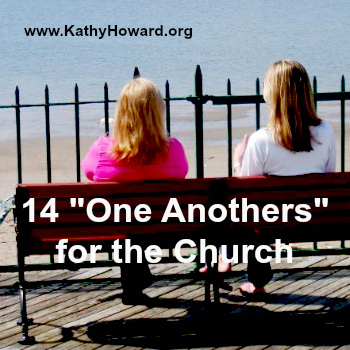

God does not intend for us to live out our faith on our own. When He saves us, He saves us into His family, the church, so we can live and grow together with other believers. We cannot be everything God desires for us, we cannot fulfill God’s purposes for us, we cannot receive everything God has for us, without a vital connection to a local church.
#Christians cannot live out the #faith God intends apart from a #LocalChurch
Click To Tweet
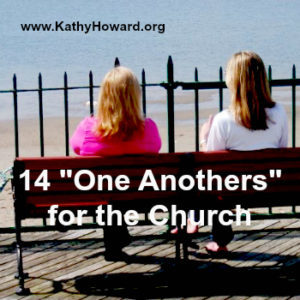 God designed the church to be a unique fellowship. The Bible uses the Greek word koinōnia to describe this spiritual relationship between believers (Acts 2:42). Koinōnia means “having in common, sharing, partnership, fellowship.” Individual believers both receive what they need and give what others need within the context of the church.
God designed the church to be a unique fellowship. The Bible uses the Greek word koinōnia to describe this spiritual relationship between believers (Acts 2:42). Koinōnia means “having in common, sharing, partnership, fellowship.” Individual believers both receive what they need and give what others need within the context of the church.
So, what does this giving and receiving – this koinōnia – look like? There is not one single passage in the Bible that gives a detailed, all-encompassing description. However, the New Testament is peppered with examples, principles, and commands about what believers should be for each other. For example, the phrase “one another” is frequently used to point to a specific way believers should relate to other believers. Although the following list is not comprehensive, these 14 “one anothers” are a great start to helping us understand the koinōnia of the church.
14 #OneAnother for the #church today
Click To Tweet
14 “One Anothers” for the Church Today
Love one another (John 13:34-35, 1 John 4:7)
Comfort one another (2 Corinthians 13:11)
Serve one another (Galatians 5:13, 1 Peter 4:10)
Restore one another (Galatians 6:1)
Bear one another’s burdens (Galatians 6:2)
Forgive one another (Ephesians 4:32)
Build up one another (1 Thessalonians 5:11)
Honor one another (Romans 12:10)
Do good to one another (1 Thessalonians 5:15)
Meet one another’s physical needs (James 2:15-17, 1 John 3:17)
Pray for one another to be healed (James 5:16)
Show hospitality to one another (1 Peter 4:9)
Teach and admonish one another (Colossians 3:16) – correcting wrong belief and behavior and instilling correct belief and behavior
Spur one another to good deeds (Hebrews 10:24)
These “one anothers” reveal the scope and depth of our koinōnia relationship – from putting the needs of others before our own to allowing another believer to hold us accountable for our behavior. This spiritual relationship is so different than anything we can find in the world. Only in the church can we give and receive everything God intends. He has provided everything we need through “one another.”
In what ways have you experienced the unique koinōnia of the church?
The post 14 One Anothers for the Church Today appeared first on Kathy Howard.
February 16, 2017
What should I do with Philippians 3:14?


Recently I joined a First Place 4 Health online small group for prayer, Bible study, and accountability. Our activities include a weekly Scripture memory verse. This week – our first week – we were challenged to memorize Philippians 3:14.
 I taped the Scripture card to my desk where I can see it all the time and began to work on it. But soon I began to have questions. I needed to know more about the verse. If I’m going to work to “hide God’s Word in my heart” then I need to know its meaning, its truth, so I can understand it and apply its principles to my life.
I taped the Scripture card to my desk where I can see it all the time and began to work on it. But soon I began to have questions. I needed to know more about the verse. If I’m going to work to “hide God’s Word in my heart” then I need to know its meaning, its truth, so I can understand it and apply its principles to my life.
First, I needed to understand the context. So I backed up and read the entire third chapter of Philippians. Paul began by addressing a false teaching plaguing the Gentile believers in Philippi. Jewish Christians were pressuring them to be circumcised. Paul passionately reminded the Philippians not to place in any value in works or accomplishments. Instead they must focus on Christ and push forward to God’s purpose for them.
I press on toward the goal to win the prize for which God has called me heavenward in Christ Jesus. Philippians 3:14, NIV
Once I had the basic context, the specific verse prompted three questions I wanted to answer. So back to the larger context to find my answers!
What is the #goal of #Philippians3:14 #ScriptureMemory
Click To Tweet
What is the “goal” I’m to press toward?
My “goal” is to be all Jesus saved me for and wants me to be (Philippians 3:12) – including experiencing the resurrection of the dead (Philippians 3:11) and receiving my glorified body (Philippians 3:21).
What is the #prize of #Philippians3:14 #ScriptureMemory
Click To Tweet
2. What is the “prize” God has called me to?
Our “prize” is glorious! Here are the things I found:
To know Christ – and that’s priceless gain! (Philippians 3:8)
To have Christ (Philippians 3:8)
To become one with Christ (Philippians 3:9)
To experience Christ’s mighty power (Philippians 3:10)
What does it mean to #PressOn #Philippians3:14
Click To Tweet
3. What does it look like to “press on?”
“Pressing on” requires discipline, diligence, and determination. It’s a lifelong process of following Christ in trust and obedience. Here are a few specifics I found in chapter 3.
I must get my priorities straight – Jesus over earthly things (Philippians 3:8)
I must trust in Christ’s ability to save and not my own abilities (Philippians 3:9)
I must focus on my sanctification (Philippians 3:12)
I must not dwell on past failures – or successes – that would keep me from moving forward (Philippians 3:13)
I must “dethrone” my earthly appetites and enthrone Jesus (Philippians 3:19)
Wow! There’s a lot of punch behind that one little verse. These 20 words reflect a lifetime of faith and discipleship. I’d say that’s worth taking to heart.
How do you feel about memorizing Scripture? Do you find it too hard? Are you working on a passage now? If so, I’d love to hear what it is!
Want to memorize Philippians 3:14? Print this Scripture memory card to help! (Click on the photo below to access the printable PDF.
Want some help memorizing God’s Word? Here are some Scripture Memory resources to check out:
Scripture Memory Tips
7 Activities to Help You Memorize Scripture
Salvation Basics Scripture Memory Plan
The post What should I do with Philippians 3:14? appeared first on Kathy Howard.
February 13, 2017
My Top Ten – Plus One – Chocolate Favorites


 Chocolate is my love language and I speak it fluently. In honor of the Chocolate Holiday (aka “Valentine’s Day), I’d like to share some of my chocolate favorites with you.
Chocolate is my love language and I speak it fluently. In honor of the Chocolate Holiday (aka “Valentine’s Day), I’d like to share some of my chocolate favorites with you.
I do have a few “chocolate quirks.” For instance, I LOVE chocolate and I LOVE ice cream, but I don’t particularly care for chocolate ice cream. I like nuts covered in chocolate, but not nuts in my chocolate. And yes, there is a difference. Same goes with chocolate and fruit. Fruit dipped in chocolate is great, but don’t put fruit in my chocolate. In fact, there is something just wrong about chocolate covered cherries.
#Valentines treat. My #chocolate #topten plus one
Click To Tweet
Top Ten Chocolate Favorites (Plus One)
Without further ado, here are my chocolate go-tos. (In no particular order)
Dairy Milk chocolate bar – quite possible the creamiest chocolate bar ever!
Hershey’s Best Brownies (recipe below!) – I’ve been making these brownies for probably 25 years!
M&Ms – a truly classic fav!
Cadbury Mini-Eggs – only available around Easter. Ya’ll, I can’t stop eating these. So I try NOT to buy them. If you have more discipline than I do, try them out. You can order on Amazon and get them tomorrow with Prime!
Cadbury Mini-Eggs Christmas version! – Oh yes!
Lindt Milk Chocolate Lindor Balls – These may be my #1.
Mocha Truffles – The perfect combination of chocolate, cream cheese, and chocolate. I traditionally make these at Christmas. Here’s the recipe!
Warm Chocolate Melting Cake – ate it every night on our last Carnival Cruise. They actually gave me the recipe, but when I tried to recreate it, it just wasn’t the same. Maybe it’s because I messed up converting the recipe from 200 servings to 12! I found this recipe online. Not sure if it’s legit, but it’s probably worth trying. And it only makes 6 servings!
Hershey’s Peppermint Bark Bells – If you like mixing peppermint with your chocolate, check these out next Christmas!
Fudge Richey – from “Susie’s South Forty” in Midland, Texas (Ladies, it’s chocolate-covered fudge!) And you can order online. And although their Pecan Toffee doesn’t have chocolate, it is fabulous!
Rolo Pretzel Delights – I was finished with my top ten when I remembered this brand new favorite, so you get a bonus. A friend brought these to a ladies’ lunch in December and I could not get enough. I had to go home and make some. Super easy, but super addictive, so watch out. Here’s the recipe!
I’d love to hear about your chocolate favorites and any quirky chocolate rules!
Hershey’s Best Brownies
I got this recipe off the back of a canister of Hershey’s cocoa many years ago. However, the chocolate chips are my addition!
1 cup butter
2 cups sugar
2 tsp vanilla
4 eggs
¾ cup cocoa
1 cup flour
½ tsp baking powder
¼ tsp salt
1 cup chocolate chips
Heat oven to 350 degrees. Melt butter in a large bowl. Stir in sugar and vanilla. Add eggs, one at a time, beating well. Add cocoa, beat. Add flour, baking powder and salt. Beat well. Mix half the chocolate chips into the batter and spread into a greased 9×13 pan. Sprinkle remaining chocolate chips on top. Bake 30 minutes only!
The post My Top Ten – Plus One – Chocolate Favorites appeared first on Kathy Howard.
February 10, 2017
6 Things You May Not Know about Apostle Paul
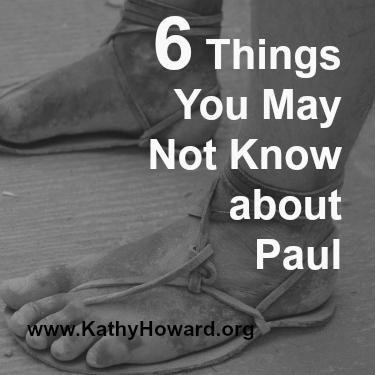

 I thought I knew him. I’ve followed his ministry. And over the years, I’ve spent a lot of time reading his writings. But recently, I realized I didn’t know as much about the Apostle Paul as I thought.
I thought I knew him. I’ve followed his ministry. And over the years, I’ve spent a lot of time reading his writings. But recently, I realized I didn’t know as much about the Apostle Paul as I thought.
While studying Paul’s life for my latest Bible study, I discovered several “new” things about the apostle of grace. Of course they were there all along; I had simply overlooked them. Maybe some will be new to you too.
6 little-known facts about Paul
Paul didn’t jump right into long-term ministry (Galatians 1:13-18) – In my mind, Paul met Jesus on a dusty road, spent three days fasting in Damascus, regained his eyesight, then jumped right into ministry to the Gentiles and never looked back. But a closer examination of Scripture tells a little different story. In his letter to the Galatians, Paul wrote he “went immediately into Arabia (Galatians 1:17).” In fact, he didn’t return to Jerusalem for three years (Galatians 1:18). What did Paul do during all this time in Arabia? Many scholars feel this may have been a spiritual retreat for Paul, a time to reconcile everything he knew from the Old Testament Scriptures with his new reality in Christ. In Arabia, Paul could immerse himself in the reality of his Savior and focus on learning and growing in preparation for ministry.
Paul’s nephew saved his life (Acts 23:12-35) – After Paul’s arrest by a Roman commander in Jerusalem, 40 Jewish men bound themselves in an oath to not eat or drink anything until they had killed Paul. The Jewish leaders agreed to help them by petitioning the Roman commander to bring Paul before the Sanhedrin for questioning. The assassins planned to attack Paul during the transfer. But the son of Paul’s sister heard of the plot and reported it to Paul at the Roman barracks. When Paul told a centurion, the Roman commander ordered a detachment of almost 500 guards to move him to Caesarea under the cover of night.
Saul’s name was not changed to Paul (Acts 13:6-9)– During the biblical account of Paul’s first missionary journey, Luke writes: “Then Saul, who was also called Paul…” (Acts 13:9). From this point forward, Luke only refers to the apostle as “Paul.” This shift does not reflect a name change, as has often been said, but rather a conscious decision on Paul’s part to use a name he already had. Since Paul was a Roman citizen, he would have been given three names at birth. The third – Paul’s Latin name – was a better fit for the predominately Roman environment. “Saul the Pharisee” chose to be known as “Paul, citizen of Rome.”
God gave Paul more than he could handle (2 Corinthians 1:8-11) – Paul and his companions suffered such extreme pressure during a particular situation in Asia they “despaired even of life.” Scholars aren’t sure what event Paul referred to in these verses, but it was a situation so dire Paul believed he and his companions might die. He saw no way out of the life-threatening situation. And indeed, without God’s miraculous intervention, they would have perished. When all human hope was lost God delivered them by His grace through the prayers of the believers (2 Corinthians 1:11).
Paul visited heaven before his death (2 Corinthians 12:1-10) – God gave Paul a glimpse of heaven during his early years as a believer, perhaps during his time of spiritual retreat in Arabia (Galatians 1:17). Paul didn’t know if he had been physically transported or was there in spirit. But he saw and heard “inexpressible things.” Pride would be the natural sinful response to an experience like this, but pride and conceit have no place in God’s servant. Therefore, God allowed something into Paul’s life to foster humility – a “thorn of the flesh.”
Paul felt deserted by everyone but God (2 Timothy 4:9-18) – Throughout Paul’s ministry he suffered trials and persecution for the sake of Christ. He was stoned, beaten, imprisoned, shipwrecked, and betrayed. He often went without food, sleep, and shelter. During his Roman imprisonment, he also felt alone with no other person to support or defend him. Demas left him because he loved the world. Alexander did him “a great deal of harm.” Yet through it all, the Lord stood with him. Paul was comforted and strengthened by God’s powerful presence.
6 facts about #ApostlePaul you may not know
Click To Tweet
#Saul did not CHANGE his name to #Paul and other little-known facts
I would love to sit down with Paul and hear all his stories, find out all those things not recorded in Scripture. Perhaps he would recount all the Gospel victories and tell me more about the suffering he endured for the name of Christ. Pain and struggle may have marked his life, but God’s lavish grace sustained him every moment.
Was one of these facts about Paul new to you? If so, which one? Do you know any other little-known facts about Paul?
This article first appeared on www.Crosswalk.com on July 15, 2016.
The post 6 Things You May Not Know about Apostle Paul appeared first on Kathy Howard.
February 6, 2017
Spiritual Junk Food


 Yesterday, in the grocery store, I made some poor choices. The Super Bowl was my primary excuse. My husband’s requests ran a close second. But much of the junk food also happened to be my favorites.
Yesterday, in the grocery store, I made some poor choices. The Super Bowl was my primary excuse. My husband’s requests ran a close second. But much of the junk food also happened to be my favorites.
Nothing required any preparation and met the requirement of having “plenty of snacks for all four quarters.” Chips. Hot wings. Jalapeno poppers. Ice cream. Popcorn. You know, football food.
Instead of buying real food and committing to the effort I know must accompany it, I bought frozen, pre-made, easy-to-fix, nutritionally lacking junk food. Sadly, the only benefit that kind of food can give is momentary pleasure.
As I loaded my selections on the checkout counter I thought about two things. First, I knew I would regret my “food” choices on Monday. And second, I thought about how often I make the same mistake with my spiritual health. I resist the effort it takes to feast on the nutritional meat of God’s Word and instead binge on spiritual junk food.
How’s your #spiritualdiet? Healthy or #SpiritualJunkFood?
Click To Tweet
The author of Hebrews addressed a similar issue with his readers:
There is much more we would like to say about this, but it is difficult to explain, especially since you are spiritually dull and don’t seem to listen. You have been believers so long now that you ought to be teaching others. Instead, you need someone to teach you again the basic things about God’s word. You are like babies who need milk and cannot eat solid food. For someone who lives on milk is still an infant and doesn’t know how to do what is right. Solid food is for those who are mature, who through training have the skill to recognize the difference between right and wrong. Hebrews 5:11-14, NLT
These “Peter Pan” Christians didn’t want to grow up. Their diet of spiritual milk temporarily relieved their spiritual hunger. Contentedly skipping along on the surface of their faith, they took in the same basics over and over. They refused to put forth the disciplined effort that spiritual growth and maturity requires. They took the easy path instead of working to ingest the rich, healthy meat of God’s Word.
We often live the same way, filling the holes in our spirits with mere baby food, or even spiritual junk food. We play in the shallows and talk about how great the water is when we could – and should – be in over our heads.
Examples and characteristics of #SpiritualJunkFood
Click To Tweet
Examples of Spiritual Junk Food
Spiritual junk food sits eye level on the shelf. It’s easy to grab for a quick bite. Here are a few examples:
Quick devotional thoughts based on a small passage pulled out of its context
Visually pleasing memes with an inspiring, spiritual-light slogan
On-the-run prayers substituted for time on our knees
Characteristics of Spiritual Junk Food
While a few things on the spiritual fast-food menu can give some benefit – I enjoy a beautiful meme as much as the next person – they should be appetizers or snacks, not the basis for our spiritual diet. Evaluate your spiritual diet by reflecting on these characteristics of spiritual junk food:
Gives quick, but fleeting spiritual satisfaction
Lacks deep, real spiritual value
Provides a “feel good” spiritual high with no correction, challenge, or call to obedience
#SpiritualHealth requires preparation, discipline, and persistence
Click To Tweet
Our spiritual health requires preparation, hard work, discipline, and persistence. If we want to be spiritually mature, we must train ourselves to be godly (1 Timothy 4:7-8). We can’t microwave spiritual growth.
How’s your basic spiritual diet? Is there some junk food in your diet you weren’t even aware of?
If you’d like to evaluate your discipleship check out this post.
The post Spiritual Junk Food appeared first on Kathy Howard.
February 2, 2017
4 Questions Answered about Real Love


 What is real love? If you believe the movies, it’s defined by two beautiful celebrities locked in a passionate embrace. Our culture equates “love” with sexual attraction.
What is real love? If you believe the movies, it’s defined by two beautiful celebrities locked in a passionate embrace. Our culture equates “love” with sexual attraction.
But that’s not real love. That’s just physical desire. And it’s fleeting at best. Like chocolate on a hot day, it doesn’t last long.
Why do we love? If you follow the example of our culture, we “love” to benefit self. We love those who deserve it or those who can help us in some way.
But that’s not real love. That’s simply shallow selfishness.
Our culture – and even ourselves – cannot teach us about real love. Only God can.
What is real love?
But God’s Word has the answers. The Bible defines love. The Bible tells us how to love, who to love, and why to love.
#RealLove Bible tells us how to #love, who to love & why to love
Click To Tweet
Real love is divine love. God calls us to love one another like He loves us (John 13:34-35). The Greek word translated as “love” is agape. It is love of volition, not emotion. We can choose to act in love toward another. Agape is also based on the character of the one acting in love and not the worth of the recipient. God loves us because of His perfect, holy nature, not because we deserve His love.
God loves us because of who He is not because of who we are. He loves because it is His holy nature to do so. That’s why God’s love is completely unconditional. It is based on His perfect self.
God’s love should be our example. Not our culture. We love others because God loved us first. Even when we didn’t deserve it.
How should we love?
This is a tall order. Jesus said we are to love each other like He loves us. Jesus gave His life for us. He put our needs ahead of His own and trusted the Father with the outcome. (See John 15:9-14.)
Who should we love?
Jesus told us to love three groups of people. First, we are to love our fellow believers (John 15:12). Second, we are to love “our neighbors” (Matthew 19:19). Third, we are to “our enemies” (Matthew 5:43-44).
Huh. That sounds like pretty much everybody to me.
Why should we love?
“We love because He first loved us” (1 John 4:19). We are to love others because God loves us. He made us in His image. He calls us to reveal the love of Christ to the world. He is a God of love and we are to be people of love.
Love others like God loved us. Big assignment. But we also have a big, loving God.
“God is love. Whoever lives in love lives in God, and God in him.” 1 John 4:16b
Love. God is our reason, our example, and our enabler.
#RealLove God is our reason, our example, and our enabler
Click To Tweet
What do you find the hardest about loving others as God loves you?
The post 4 Questions Answered about Real Love appeared first on Kathy Howard.
January 30, 2017
Is Your Past Pointless or Purposeful?


 When you look back on your life, do you feel it to be full of things and events that are pointless or purposeful? Is it all just random or is everything in some way relevant?
When you look back on your life, do you feel it to be full of things and events that are pointless or purposeful? Is it all just random or is everything in some way relevant?
Our lives are collections of life experiences, education, relationships, griefs, trials, wins, losses, failures and successes. We may see some – or much of it – as a waste. Pointless. But nothing in our lives that we may see as a twist, turn, or detour was a surprise to God.
God doesn’t waste anything. What we may see as “bad,” God wants to use for our good. What we may see as a difficult random road to nowhere, God sees as a purposeful path. A purposeful path He has forged to lead us into the future He has for us.
Your #past? Random road or purposeful path?
Click To Tweet
When God saves us, He doesn’t merely save us from our sins and an eternity separated from Him. He also saves us into a purposeful life serving Him.
For it is by grace you have been saved, through faith—and this is not from yourselves, it is the gift of God— not by works, so that no one can boast. For we are God’s handiwork, created in Christ Jesus to do good works, which God prepared in advance for us to do. Ephesians 2:8-10
He works in and through everything in our lives to shape us, equip us, and prepare us for His purposes. For instance, God uses all our trials and difficulties of life to refine and grow us spiritually. He works through them to make us the people He can use for His glory. (See 1 Peter 1:6-7.) He uses our background, education, experiences, and passions to shape us into the tool He needs for the works He has prepared for us.
Your #past is not a random road. It’s God’s #purposeful path to the #future
Click To Tweet
No matter how random your past road may look to you, it’s God’s purposeful path to His future for you. If you aren’t sure what God wants for your life now, look back. Review see where He has taken you and what He’s allowed into your life.
Your past can bring clarity to your future. Do you see it?
The post Is Your Past Pointless or Purposeful? appeared first on Kathy Howard.
January 26, 2017
What is the Unpardonable Sin?


 Have you ever worried that you’ve committed the “unpardonable sin?” That one thing Jesus won’t or can’t forgive? Even though I’ve been a Christian a long time, I still sin regularly. A selfish thought. A careless, hurtful word. Or something even more harmful. So, is it possible for me – or you – to commit the unforgivable sin? How can we know if we have?
Have you ever worried that you’ve committed the “unpardonable sin?” That one thing Jesus won’t or can’t forgive? Even though I’ve been a Christian a long time, I still sin regularly. A selfish thought. A careless, hurtful word. Or something even more harmful. So, is it possible for me – or you – to commit the unforgivable sin? How can we know if we have?
Jesus is the One who warns us about this unforgiveable sin (Mark 3:20-30 and Matthew 12:22-32.) “Truly I tell you, people can be forgiven all their sins and every slander they utter, but whoever blasphemes against the Holy Spirit will never be forgiven; they are guilty of an eternal sin” (Mark 3:28-29).
What is the #unpardonablesin?
Click To Tweet
Jesus defined this “eternal sin” as blasphemy against the Holy Spirit. The Greek word translated as “blasphemy” means “to speak contemptuously of God; to speak evil of God.” And the grammar in this passage shows continuous action. But we need more than this definition to really get a handle on the unforgiveable sin.
The context of the two Bible passages that contain Jesus’ warning helps us tremendously. In fact, right after His declaration in Mark, the Gospel writer clarified with this: “He said this because they were saying, ‘He has an evil spirit.”
Jesus had been performing miracles, including freeing many people from possession by evil spirits. The “teachers of the law” refused to acknowledge His power came from the Holy Spirit and instead claimed His power came from Satan. Jesus showed them the foolishness of their “logic.” How can Satan drive out Satan?… If Satan opposes himself and is divided, he cannot stand; his end has come (Mark 3:23, 26).
These teachers of the law were committing the unforgiveable sin. They refused to acknowledge the power and work of the Holy Spirit, and in fact, gave Satan the credit.
A post on BillyGraham.org helps us understand this concept:
The sin of the religious leaders, blasphemy against the Holy Spirit, was a refusal to accept the witness of the Holy Spirit to who Jesus was and what He had come to do, and then submit their lives to Him. Jesus said concerning the Holy Spirit, “When he comes, he will convict the world of guilt in regard to sin and righteousness and judgment” (John 16:8). They chose rather to reject the Spirit’s witness to their sin and to Jesus, and accused Him of being demon possessed!
Once again, the unpardonable sin is not some particularly grievous sin committed by a Christian before or after accepting Christ, nor is it thinking or saying something terrible about the Holy Spirit. Rather, it is deliberately resisting the Holy Spirit’s witness and invitation to turn to Jesus until death ends all opportunity.
The unpardonable or unforgiveable sin (blasphemy against the Holy Spirit) is a continual rejection of the identity, authority, and work of the Holy Spirit. In the Jewish leaders’ case, the deliberate rejection of the HS’s work through Jesus. Someone commits the unpardonable sin only when they continually reject the Holy Spirit’s conviction of sin and His invitation to receive forgiveness through Jesus Christ. If you are a believer, you have already accepted the Holy Spirit’s invitation.
The post What is the Unpardonable Sin? appeared first on Kathy Howard.
January 23, 2017
My Favorite Bible Story
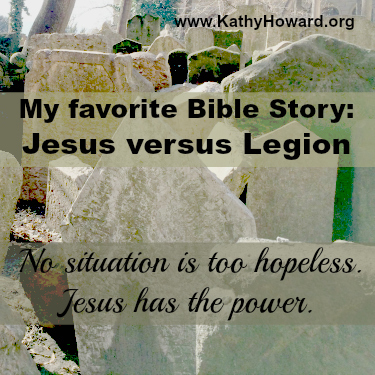

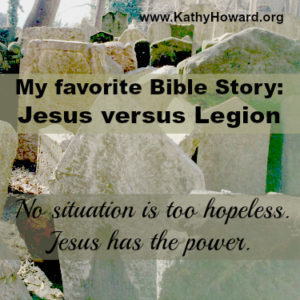 I love all of God’s Word. Even the hard parts. But I do like some parts more than others. And like many of you, I have a favorite Bible story. In fact, one particular miracle of Jesus captivates my attention. Every time I read it I get goose bumps. Literally. Although action and edge-of-your-seat suspense pack the story, what it teaches me about Jesus enthralls me.
I love all of God’s Word. Even the hard parts. But I do like some parts more than others. And like many of you, I have a favorite Bible story. In fact, one particular miracle of Jesus captivates my attention. Every time I read it I get goose bumps. Literally. Although action and edge-of-your-seat suspense pack the story, what it teaches me about Jesus enthralls me.
The event occurs right on the heels of a full day of teaching and what the disciples considered a near-death experience during a furious squall on the Sea of Galilee (Mark 4:35-41). While the storm terrified them, it was Jesus’ demonstrated authority over nature that left the disciples shaking in their sandals.
Jesus versus Legion
Still reeling from that experience, Jesus and the twelve were greeted on the opposite shore by a character straight out of a horror flick. Possessed by demons, no one was strong enough to subdue or control him. People had tried, but he tore chains and broke apart the iron bonds.
No situation is too helpless or hopeless. #Jesus has the #power
Click To Tweet
Now he lived among the tombs in the hills, crying out day and night and cutting himself with stones. He was helpless and hopeless. Tortured and tragic. Then he encountered Jesus and everything changed.
The demons within the man immediately acknowledged the power and authority of Jesus. Based on the fact they called themselves “Legion,” there could have been 6,000 plus demons in residence, but they knew they were no match for the Son of God. (See Mark 5:1-20 for the full story.)
Jesus freed the man with a word. In an instant everything changed. This prisoner of evil had been released by the Holy One. This man who had been feared and shunned by his community could now return to his family. Everyone had given this man up for lost. Everyone but Jesus.
This story shows #Jesus power, authority, grace & compassion
Click To Tweet
This story demonstrates not only the power and authority of Jesus but also His grace and compassion. Jesus doesn’t merely have the ability to work in our lives, He also desires to work in our lives because He cares for us.
What Jesus did in this man’s life, He can do in our lives. Our Savior is loving and kind, but He is not wimpy. He is able to accomplish what He desires to do in your life.
Is there a stronghold or problem in your life you’ve given up on? How can reflecting on Jesus’ compassion and power renew your hope?
The post My Favorite Bible Story appeared first on Kathy Howard.
January 19, 2017
Changes Ahead
 Some of you read this blog regularly. Over the years, you’ve read about my family and my travels and my ministry. And you’ve shared with me. And even though most of us have not met face to face, we have a connection through Christ and shared experience. I love that!
Some of you read this blog regularly. Over the years, you’ve read about my family and my travels and my ministry. And you’ve shared with me. And even though most of us have not met face to face, we have a connection through Christ and shared experience. I love that!
So, with that in mind, some of you may be interested in a little update about my life. We are in the midst of some changes and the next few months will be hectic – maybe even overwhelming.
First, my husband retired in December after 37 years with Conoco-Phillips. It was kind of sudden. He had planned to work two or three more years, but pretty much every oil company had layoffs last year, so when the opportunity came up, we prayed and talked and he volunteered.
In addition to adjusting to the new “retirement” schedule, for the next few weeks, Wayne and I will be busy “decluttering” the house so we can put it on the market. Our plan is to move closer to our daughters and their families.
Of course, as so often happens, this is not the only major thing happening for us. My parents are not well and neither my brother nor I live in the same city with them. It is really hard to give them the care they need long-distance. I’ve spent a lot of the last few months on the road. But God has finally brought everything together for us to be able to move them to the city where my brother lives.
That move will happen before our move. In fact, I’m heading there tomorrow to do some packing and visit my folks.
I have been fairly faithful to blog twice a week – every Monday and Thursday. I love sharing with you and I love hearing from you. And I have this thing about being consistent.
But when I sat down to write the post for today, I thought “I’ve got nothing!” So, instead of some interesting illustration or devotional thought or brief time in the Word, I decided simply to share what’s going on with us. And maybe you’ll remember it in case I miss a day – or two – of posts in the weeks ahead.
I’d love to hear from you! What big or little thing is dominating your life right now?
The post Changes Ahead appeared first on Kathy Howard.




